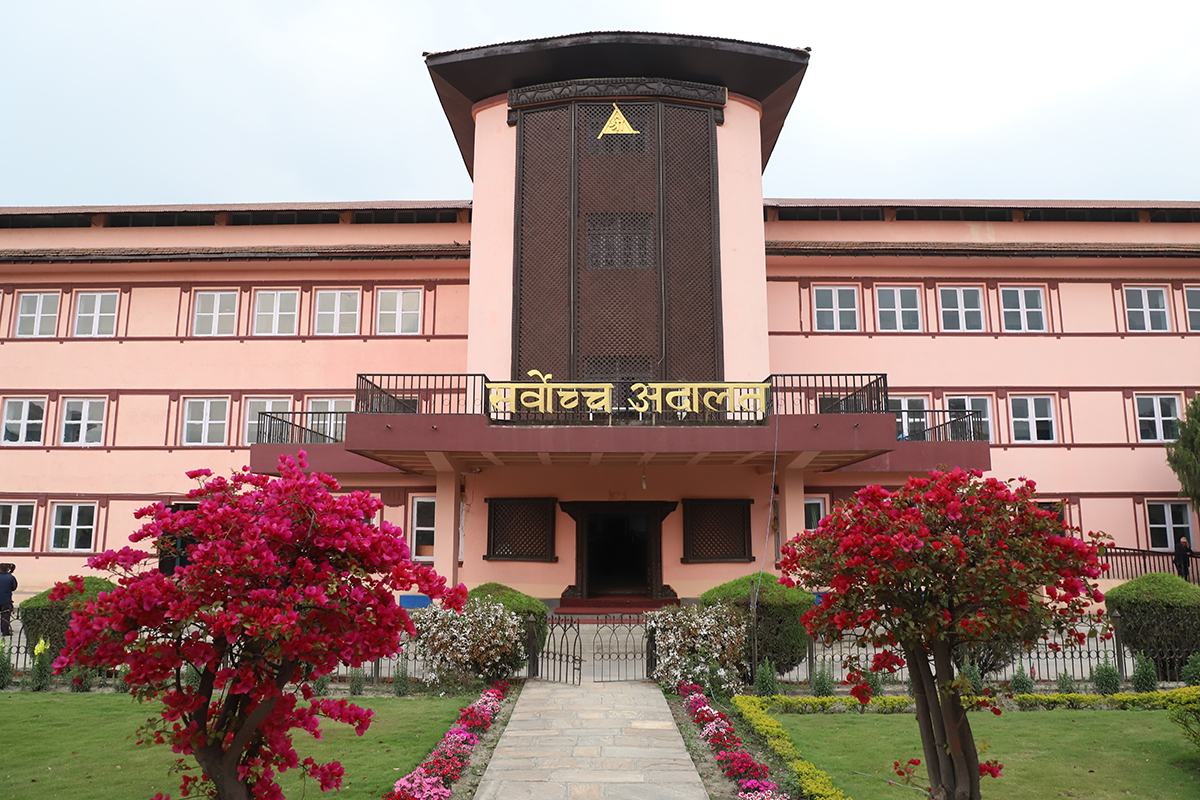Hearing on House dissolution
Amicus Curiae starts offering its views

By Ranju Kafle
Kathmandu, Feb. 17: Amicus Curiae began putting forth its views on the issue of House dissolution in the constitutional bench at the Supreme Court from Tuesday right after the petitioners concluded their pleading.
Senior advocate Badri Bahadur Karki pleaded today and said that the Constitution remained silent regarding the rights of the Prime Minister to dissolve the House of Representatives. “An elected Prime Minister can dissolve the House if needed, however, this time it came with a malicious intent,” he said.
Karki also said that the right of dissolution was left silently in Article 76 (7) and 85 of the Constitution.
Justice Anil Sinha interrupted him and asked whether the articles were silent themselves or were left silently? “Both Articles 76 (7) and 85 are silent in the Constitution,” Karki responded.
Senior advocate Karki also claimed that the right to House dissolution was not removed clearly from the Constitution. “The provision of dissolution which was in Article 53 (4) in Nepal’s Constitution-1990 still exists in Article 85, but silently,” he added.
Justice Sinha again asked how silent articles had been activated now. “The Articles get activated when the Prime Minister elected under article 76 (1) used the rights of 76 (7) to dissolve the House,” Karki responded to the Justice.
According to him, the House can be dissolved under Article 76 (7) if the parliament fails and it will be dissolved legally under Article 85 when the government fails. The move was taken with malicious intention because the Prime Minister dissolved the House to manage inner-party dispute.
The hearing has continued on working days from January 17 in the Supreme Court. Chief Justice Cholendra SJB Rana and Justices Bishwambhar Shrestha, Tej Bahadur KC, Sapana Malla Pradhan and Anil Sinha have been hearing the case in the bench.
What is Amicus Curiae?
Amicus Curiae in Latin means a friend to the court. There could be a person or group of people who are not a party to an action but have a strong interest in the matter to plead in the court. It is formed to inform or advise the court to minimise possible error in judgment.
The Supreme Court had formed the Amicus Curiae comprising advocates Badri Bahadur Karki, Satish Krishna Kharel and Bijayakanta Mainali from Nepal Bar Association and Purnaman Shakya and Geeta Pathak from the Supreme Court Bar Association.
Recent News

Do not make expressions casting dout on election: EC
14 Apr, 2022
CM Bhatta says may New Year 2079 BS inspire positive thinking
14 Apr, 2022
Three new cases, 44 recoveries in 24 hours
14 Apr, 2022
689 climbers of 84 teams so far acquire permits for climbing various peaks this spring season
14 Apr, 2022
How the rising cost of living crisis is impacting Nepal
14 Apr, 2022
US military confirms an interstellar meteor collided with Earth
14 Apr, 2022
Valneva Covid vaccine approved for use in UK
14 Apr, 2022
Chair Prachanda highlights need of unity among Maoist, Communist forces
14 Apr, 2022
Ranbir Kapoor and Alia Bhatt: Bollywood toasts star couple on wedding
14 Apr, 2022
President Bhandari confers decorations (Photo Feature)
14 Apr, 2022










